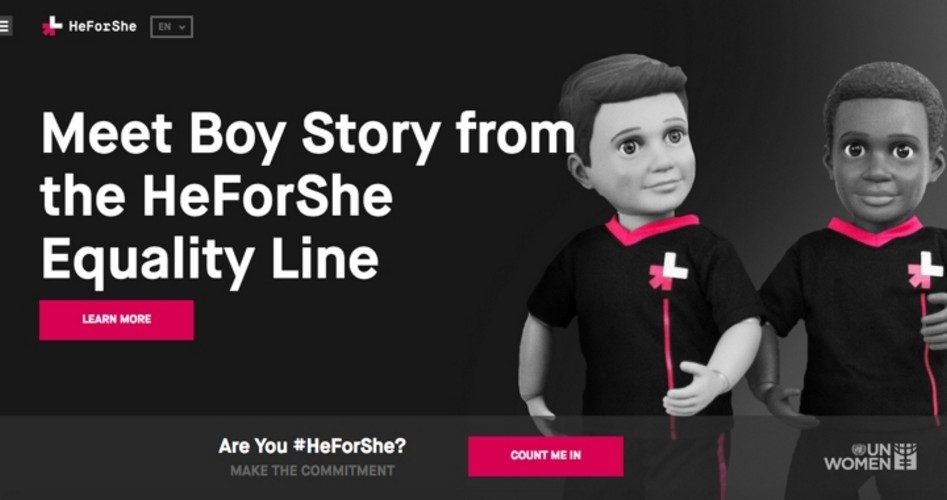
There certainly have to be some intermediate steps between your son’s birth and his ingestion of puberty-blocking drugs and subsequent “gender-reassignment surgery,” and the United Nations is on the case. It has joined forces with a new company to push dolls for boys so your child can get in touch with his “feminine side.”
Writes PR Newswire, “HeForShe, UN Women’s global solidarity movement for gender equality has teamed up with start-up company … Boy Story to launch two special edition action dolls named Billy and Mason. The action dolls challenges [sic] current prejudice surrounding boys playing with dolls, and promotes the notion that both boys and girls should have the same opportunity to bond with a special playmate, and that all children, regardless of their gender, need to learn nurturing, emotional intelligence, and empathy.”
Created by Boy Story founders Kristen Johnson and Katie Jarvis, Mason is a “Caucasian/Hispanic doll,” informs Circa, while Billy is “African American” (meaning black, not a North African Arab or white Afrikaner). It was not reported if they live in San Francisco’s Haight-Ashbury district or NYC’s Greenwich Village, or if they actually identify as boy dolls.
The company espouses the principles “How we play can change the world” and “Harmful stereotypes start young,” which, presumably, would include stereotyping humans as singular among creatures in (supposedly) not having innately determined sex roles.
Boy Story writes, “Girls should know that dolls are for everyone” and “Boys should know they can have dolls that look like them. They can learn to nurture, relate, and develop emotional intelligence.”
Interestingly, though, Mason and Billy represent children who can walk and talk. Wouldn’t nurturing be better encouraged if they were infants, requiring bottle feeding and diaper changes?
But that girly stuff just won’t do for this sex-stereotype-busting company, which bills their creations as “Action Dolls.” Funny, when I was a lad we had “action figures,” things such as G.I. Joe and Star Trek characters. Yet at 18” tall, I imagine Billy or Mason could just kick the G.I. out of Joe, an activity boys just might prefer to bottle feeding.
Maybe that’s better than Mason taking a thumping, though, because the special-edition version will cost you $102 — on sale. Note, it doesn’t appear the dolls are offered low-cost or no-cost in hardship cases so that poor boys won’t be denied feminization.
Each Boy Story doll comes with an associated storybook, which, I’m guessing, doesn’t involve Mason hunting with his dad or Billy going out for the football team. Then again, you never know. Explaining why the dolls are made in China, the company states that it needed to make them “both unique and very durable to hold up to all the rumbling and tumbling that boys tend to do.”
My, that boys “tend” to do? That’s awfully stereotypical. Yet if lads are innately more rumbly and tumbly, as is implied, isn’t it possible other significant inborn differences between the sexes exist?
Of course, this is not only long-understood truth, but settled science. For example, the fine Norwegian documentary The Gender Equality Paradox (video below) presents studies showing that boys and girls exhibit different behaviors immediately after birth (e.g., boys are more likely to gaze at objects, as opposed to faces). Is that infernal intrauterine socialization to blame?
https://www.youtube.com/watch?v=p5LRdW8xw70
But all the usual modern misconceptions are in play here. Boy Story writes, “Kids know and love diversity. When it comes to differences, kids really don’t care much.” So children love “diversity,” which is defined by differences, but also don’t care about differences? Whatever happened to indifference being the opposite of love?
Also note that this 2014 study indicated that even babies “show racial bias,” preferring playmates from their own group.
Boy Story also embraces the supposition, “We all start out equal,” a nonsensical idea as equality is not a thing of this world. Do we see it in nature? Within and among species, there is variation in survivability and in strength, speed, endurance, intelligence, and aggressiveness. Animals also have hierarchies; one lion rules the pride, one silverback gorilla leads his troop, and chickens really do have a pecking order.
So given that most of the equality dogmatists are also evolutionists and believe man is just another animal, they should ask themselves: Are humans really the one exception to the world’s rule of inequality? As G.K. Chesterton put it, if people “were not created equal, they were certainly evolved unequal.”
Yet the faithful have reason to reject equality dogma, too. Note that the Bible only mentions “equality” in reference to weights and measures, not man, and makes clear that we’re all gifted differently. Why, it’s even said people have unequal glory in Heaven. (Thérèse of Lisieux came to understand this after being shown a tumbler and a thimble both filled with water and then being asked: Which one is fuller?) Equality is our hang-up — not God’s.
Like so many today, Boy Story essentially warns against putting children in a “gender straitjacket” and not letting them find their own way. Yet this is misguided because child-rearing is all about structuring and limiting — and imposing values.
Consider: Would we likewise warn against placing kids in a species straitjacket? Before answering, know that just as the psychobabblers define “gender dysphoria” — the strong sense you were born in the body of the wrong sex — they also speak of “species dysphoria,” the strong sense you’re an animal stuck in a human body. For example, Texan Wolfie Blackheart claimed she was a canine and a Norwegian woman calling herself Nano swore she was a cat.
Does this mean we shouldn’t put children in clothes, have them eat with utensils, and teach them language, manners, and everything else befitting a human because they may later identify as a ferret?
Of course, the sex-equality thesis holds that so-called sex stereotyping hurts children by limiting and perhaps even stigmatizing them. But what if this is a false assumption? What if, just as we raise a boy in a species-specific way because he’s not an animal, we should also raise him in a sex-specific way because he’s not a girl?
And why? Well, if we discern that a child has a gift for music, do we treat him exactly the same as a kid gifted in golf? Are we constrained by “equality” dogma? Or do we offer one music-specific training and the other golf-specific training?
Likewise, is “sex stereotyping” really a negative force? In reality, it’s just a matter of recognizing boys’ and girls’ characteristic gifts and giving them sex-specific training allowing them to develop those qualities fully.
Thus, the truth is the opposite of what the equality dogmatists say: It’s sex-specific training that allows a child to be all he can be. Withholding it is the same as denying musical training to the musically gifted: You prevent the child from realizing his potential.
The kicker here is that virtually no one who has pondered the issue deeply really believes in equality, anyway. For example, activists may caterwaul about equal pay for women in sports, but when do they ever propose eliminating separate athletic categories for the sexes? Or are they separate because they’re not equal?
Perhaps we should remember that “how we play can change the world” — and stop playing fast and loose with children’s lives based on the latest psychobabble fad.
Image: screenshot of HeforShe.org website


